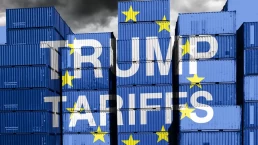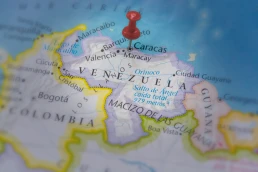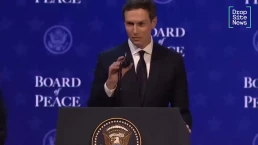One of the Right’s biggest funders and most important strategists, longtime Federalist Society head Leonard Leo, seems to be breaking with Donald Trump over tariffs.
By Corey Robin, Jacobin
This is the moment of the conservative crack-up I’ve been waiting for. It’s going to sound small, but it’s the wedge of a wider fissure.
A legal nonprofit just filed a lawsuit against Donald Trump’s declaration of tariffs on China, claiming that the emergency authority he’s invoked gives him no such authority to impose these tariffs. Underneath or alongside that claim is a much deeper argument that it’s time for Congress to claw back its delegation of tariff authority, which it has effectively handed over to the president for decades now.
But here’s what is politically significant about this lawsuit: the nonprofit filing the suit is funded in part by Leonard Leo, the longtime leader of the Federalist Society. By most people’s estimations, Leo was the single most important architect behind all three of Trump’s appointments to the Supreme Court and the overwhelming number of judges Trump appointed to the federal bench during his first term. Leo is the heart and soul of the conservative legal movement, the Principia of the judicial right. His nonprofit, named the New Civil Liberties Alliance (of course), was also the force behind the court’s overturning of the Chevron doctrine last year.

That this may be The Thing that splits the Right will come as a disappointment to the Left, which is forever hoping that it will be some basic issue of human rights or fundamental constitutional morality that breaks up the Right. Good luck with that.
The tariffs were always going to be the thing that broke up the Right, for the very same reason tariffs were the leading edge of political conflict in the nineteenth century: because they implicate the entire political economy and, beyond the political economy, more foundational questions of power and control, which are always at the heart of every fundamental constitutional conflict. Behind the tariffs in the nineteenth century, or at least the first two-thirds of the nineteenth century, was the question of slavery.
Recent Posts
Venezuela, the Revival of Regime Change, and the Decline of Empire
January 23, 2026
Take Action Now The Trump administration’s attempt to control Latin America and intimidate its leaders and citizens is, of course, nothing new.By…
Kushner Reveals Dystopic Plan to Build Data Centers on Ruins of Gaza Genocide
January 23, 2026
Take Action Now The plan appears to be to finish Israel’s bulldozing of Gaza to make real estate opportunities for investors.By Sharon Zhang,…
Opposition of Nuclear Power ‘Revival’ in New York Holds its First Forum
January 22, 2026
Take Action Now This first forum, a webinar on Jan. 15, was titled a “Symposium for Safe and Affordable Energy in New York” as part of a series…
In Response to the Renee Good killing, Dems Propose ICE Reforms That Would Have Done Nothing to Prevent the Renee Good Killing
January 22, 2026
Take Action Now Good’s killer was a 10-year ICE veteran, himself a trainer, and recorded the killing. What good would more training and more cameras…




